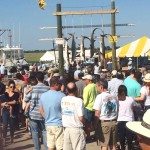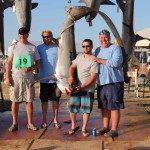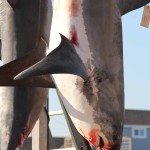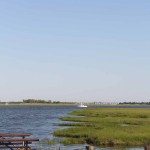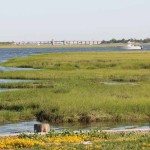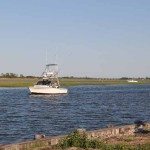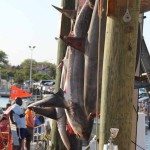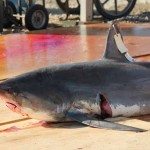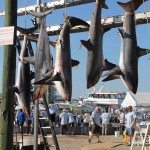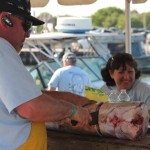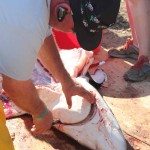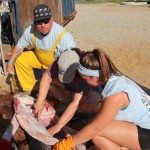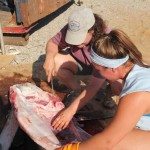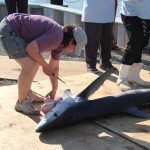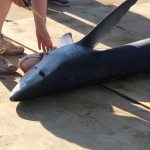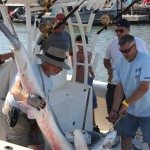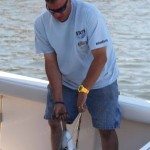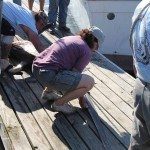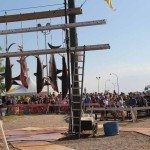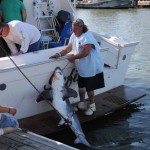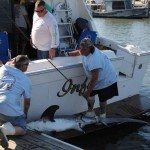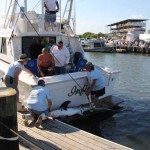It seems that bunker and mackerel fish were Long Island sharks’ breakfast of choice, luring in the 280-pound winning thresher shark in this weekend’s 44th Annual Freeport Hudson Anglers Shark Tournament from Guy Lombardo Marina in Freeport.
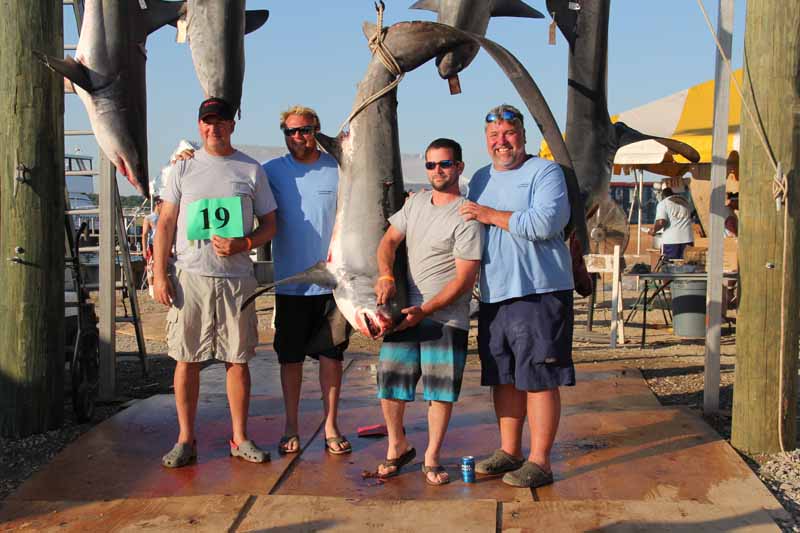
Throughout the day, the bell on the pier rang out, indicating another shark had arrived. Spare Parts, holding the first-place record, had a front row seat from approximately 9:30 a.m. as boats arrived back at the pier with entries for the win.
Spare Parts Captain Chris Wolfson of Seaford is sure this is a record for bringing in the winning shark in this particular tournament. Spare Parts speedboat passed the tournament’s committee boat, at the starting line at 6 a.m. with 133 other registered boats on Saturday, June 18.
Wolfson credits his son with the catch just 20 miles offshore and having the advantage of a speedboat.
“It was my son, Nick, who saw the fish [shark] jump. He said, ‘stop the boat!’ and rigged the bait; hooked the fish; fought the fish. We had it tied up at 6:58 a.m.”
Once Nick had his sights on the shark, the rest of the crew followed his lead. Jokingly, Wolfson said he yelled at Ed Olsen, of Roslyn, his reliable fishing partner since 1982, for not being the first to spot the shark. They enjoyed a good laugh at each other.
Olsen admitted they are both conscientious anglers; they both consider the fish’s existence and “how long has this shark or striped bass or tuna been living?” whenever they are angling.
Wolfson said, “I even get upset when people are not responsible and waste the life of bait fish, like bunker and mackerel.”—even previously caught and frozen bait. Since Spare Parts took the win early and had plenty of bait remaining, Wolfson said his bait cache from Trophy Tackle in Babylon will not go unused.
Olsen said it’s not right to just go pulling sharks from the ocean for no reason but credits tournaments for being a responsible way to participate.
One of the purposes of the Freeport Hudson Anglers Shark Tournament is to promote the conservation of immature sharks by tag and release. All participating boat captains were provided with tagging devices for any shark caught and released, part of the Cooperative Shark Tagging Program (CSTP) initiated in 1962.
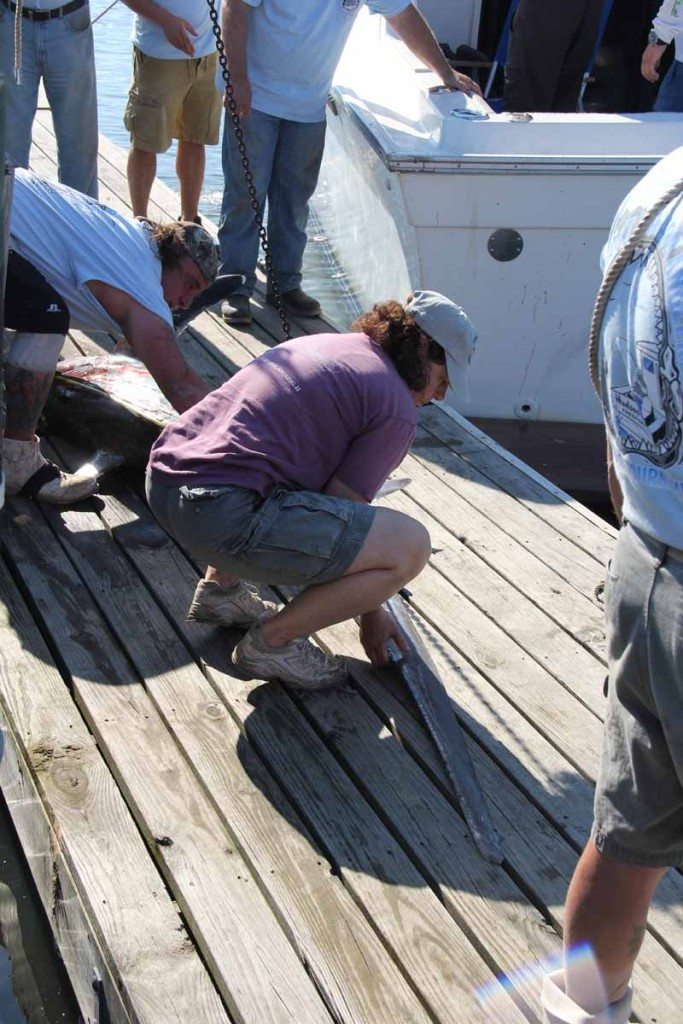
Nancy Kohler, the lead biologist with the Apex Predators Program of the National Marine Fisheries Service (NMFS) based in Rhode Island, partners with many regional tournaments, like this one, to streamline her studies of shark aging, growth, reproduction, food and migration habits.
Federal regulations stipulate that only blue, brown, tiger, mako, thresher, hammerhead and porbeagle sharks are eligible to be fished. The tournament rules that only rod and reel angling practices are to be used to catch a shark. Sharks must be more than 150 pounds in order to be taken from the sea.
In addition to arming anglers with tagging devices, Kohler also provides species data to help the tournament participants make better choices when deciding whether the shark should be tagged and released back into the ocean.
“Our data gathered from these tournaments is now feeding back to the anglers to help them better determine if a shark is acceptable to bring in,” said Kohler.
Some people in support of animal rights may say sport fishing is a terrible practice.
“People are going to fish anyway; they [anglers] are here with or without tournaments and regulations,” said Kohler. “Sharks being brought in during tournaments are well over the minimum size regulations.”
She added that tournaments are a way for researchers to put best practices into play, partnering with the anglers to gather data about ocean dwellers.
Kohler said each year’s tournament results vary. Some years she sees more mako come in, some years it’s more thresher, but in general the mid-Atlantic to Northeast ocean regions are home to more than 29 species of sharks.
Adult mako sharks, also known as blue pointer or bonito, average 10 feet in length and weigh between 130 to 300 pounds, but have been recorded as long a 14.6 feet and 1,300 pounds. Typically found in warmer waters, the mako shark dines on octopus, squid, mackerel, tuna and swordfish.
The tail of the thresher shark (or fox shark) is the most distinguishable feature, sometimes in lengths as long as the body of the shark itself. The thresher’s whip-like tail is used like a weapon to stun its prey. The thresher also prefers warmer coastal waters and feeding on squid, mackerel and tuna.
“Once the shark is caught out at sea it’s hoisted onto the boat,” said the tournament director David Gross. “If this fish is a money fish you don’t want to take a chance of something happening to it, like having it breaking loose or getting damaged.”
As the sharks are brought in by the team boats, tournament committee members move the shark from the boat to the pier where Kohler, the shark biologist, and her assistant Kathryn McA’Nulty, record data, checking the size, sex and health of the species before the shark is then weighed by the tournament committee to determine whether or not it has earned a top place on the leaderboard.
A top-weight shark is hoisted onto the display pylons until the tournament comes to the close. A shark whose weight does not rank is moved to a staging area where Kohler collects further data.
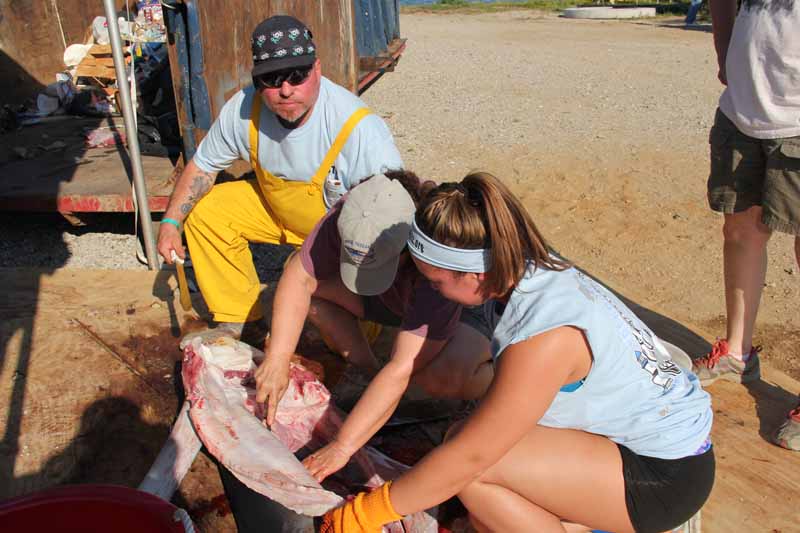
The shark is then turned over to the dressing team, father/daughter duo Frank and Frances Barrella, where it is cleaned, filleted, brined and processed for donation to local Freeport soup kitchens. While Frances (East Rockaway) has only been cleaning sharks for the past five years, Frank (Baldwin) has been cleaning tournament sharks for more than 20 years.
At 4:30 p.m. only six sharks had been brought in. The majority of the entries arrived within the last two hours of the 6 p.m. close of the tournament.
Final results:
1st-Spare Parts with a 280-pound thresher (Captain Chris Wolfson, Angler Nick Wolfson); total prize and calcutta: $47,386.
2nd-Brianna with a 274-pound thresher (Captain Anthony Coyle); total prize and calcutta: $57,494.
3rd-Mako Wish II with a 261.4-pound mako (Captain Kevin Quinton); total prize and calcutta: $15,904.
4th-White Rose with a 225-pound mako (Captain Thomas Rosenbluth); total prize and calcutta: $1,130.
5th-Meiser Point II with a 200-pound blue (Captain Collin Ahrens); total prize and calcutta $905.
6th-Bass Cheeks with a 191.6-pound thresher (Captain Kerry O’Dowd); total prize and Calcutta $21,375.
Visit the Freeport Hudson Anglers website to learn more.

